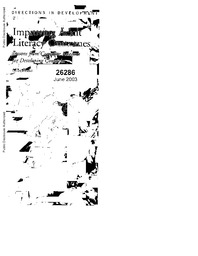
ATTENTION: The works hosted here are being migrated to a new repository that will consolidate resources, improve discoverability, and better show UTA's research impact on the global community. We will update authors as the migration progresses. Please see MavMatrix for more information.
Show simple item record
| dc.contributor.author | Abadzi, Helen | |
| dc.date.accessioned | 2014-07-03T19:37:34Z | |
| dc.date.available | 2014-07-03T19:37:34Z | |
| dc.date.issued | 2003 | |
| dc.identifier.uri | http://hdl.handle.net/10106/24334 | |
| dc.description | Citation
Abadzi, Helen. 2003. Improving adult literacy outcomes : lessons from cognitive research for developing countries. Directions in Development. Washington, D.C. : The World Bank. http://documents.worldbank.org/curated/en/2003/06/2427511/improving-adult-literacy-outcomes-lessons-cognitive-research-developing-countries | en_US |
| dc.description.abstract | Abstract
Despite the existence of about one billion illiterates in the world, adult literacy programs make up 1-5 percent of government or donor budgets, and they remain severely underfunded in comparison to primary education. Though dropout and course completion rates improved in the 1990s, the outcomes of literacy instruction are still modest and may have improved little since the 1970s. The results may disappoint governments and donors who expect that once taught, people will have usable skills and remain literate. The modest results make it hard to increase coverage and to argue for increased expenditures for this sector. The results may be due to inefficient instruction but also to the structure of human memory, which has important implications for adult literacy acquisition. The need to learn the rapid recognition of complex patterns poses problems that are not apparent to people who became expert readers in their childhood | en_US |
| dc.language.iso | en_US | en_US |
| dc.publisher | World Bank | en_US |
| dc.subject | Reading instruction | en_US |
| dc.subject | Cognitive ability | en_US |
| dc.subject | Adult basic education | en_US |
| dc.title | Improving adult literacy outcomes: lessons from cognitive research for developing countries | en_US |
| dc.type | Working Paper | en_US |
Files in this item
- Name:
- improving adult literacy outcomes ...
- Size:
- 5.703Mb
- Format:
- PDF
- Description:
- PDF
This item appears in the following Collection(s)
Show simple item record


